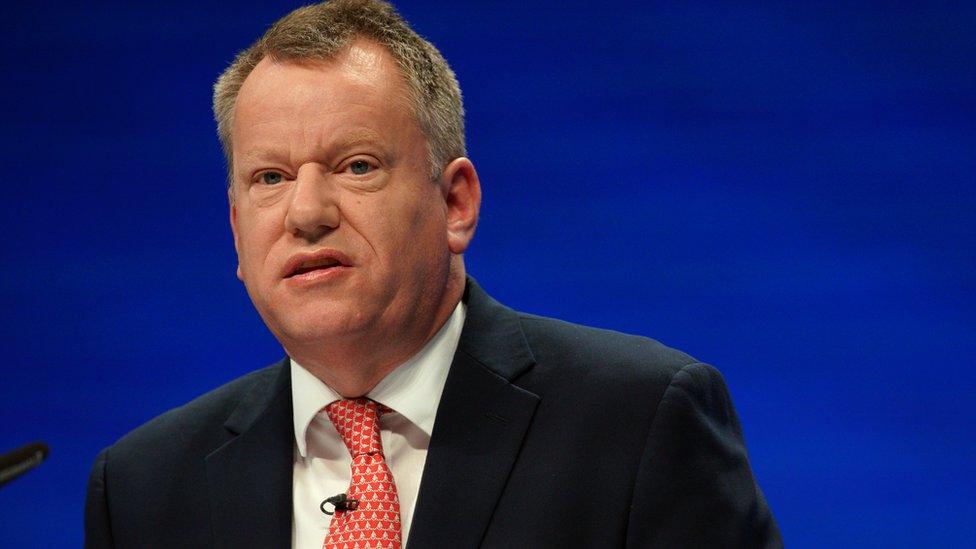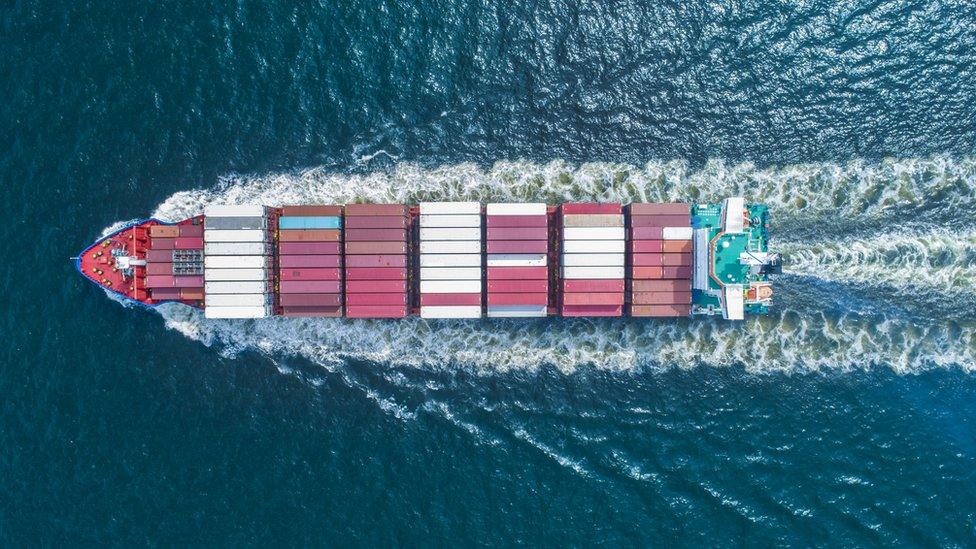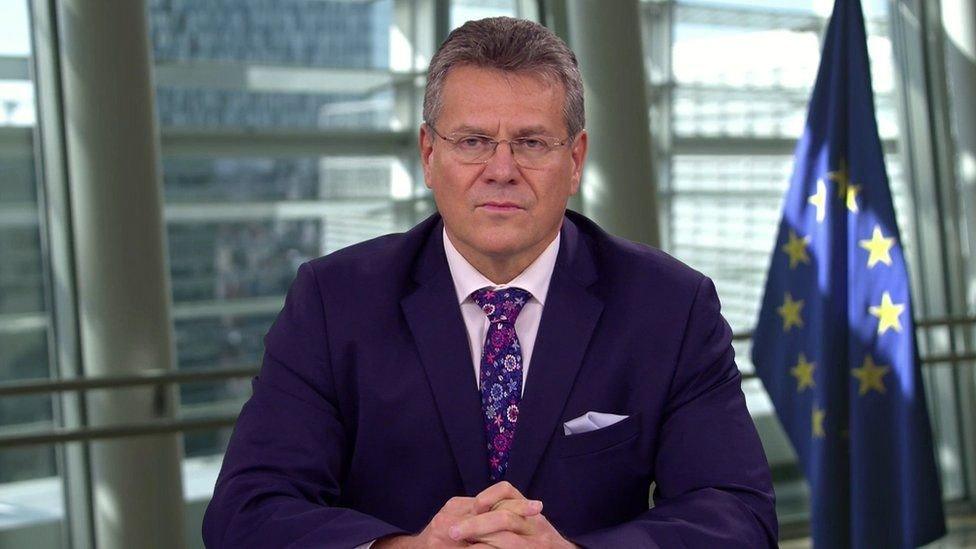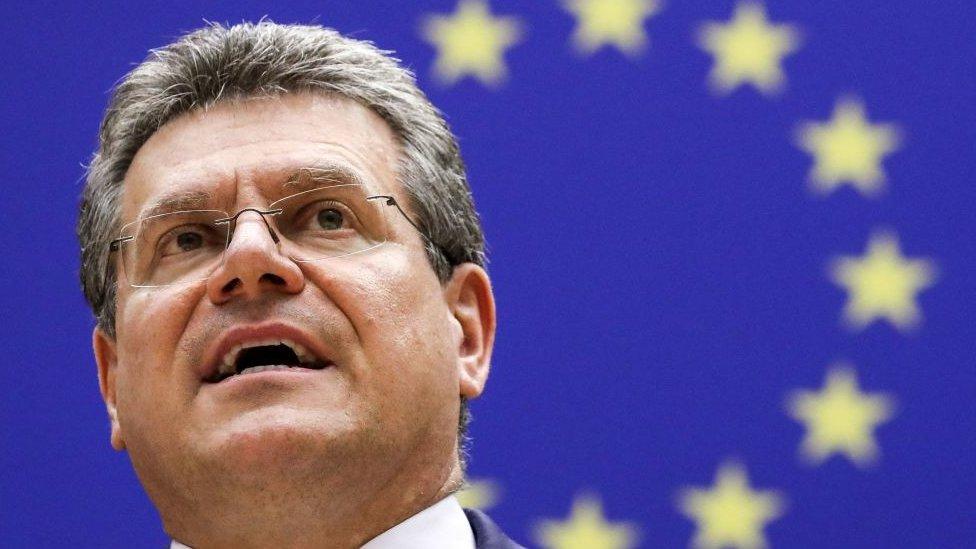Brexit: Lord Frost and Šefčovič discuss NI Protocol in Brussels
- Published
- comments

Brexit Minister Lord Frost travelled to Brussels on Friday
Brexit Minister Lord Frost has travelled to Brussels to meet his European Union (EU) counterpart Maros Šefčovič.
But they will not be commenting on the meeting, as a sign of respect for Sir David Amess MP, who was stabbed to death on Friday.
The UK and EU are expected to begin intense talks on the Northern Ireland Protocol in the next few weeks.
The protocol is the special Brexit deal for NI which was agreed in 2019.
Earlier this week, both sides laid out proposals for how the deal could be changed.
The protocol keeps Northern Ireland in the EU's single market for goods and allows free-flowing trade with the EU.
The UK says the arrangement imposes too many barriers, as goods arriving from Britain face checks and controls. Unionists say it undermines their position in the UK.
The EU acknowledges the protocol is causing difficulties for some businesses and have suggested ways in which its effects can be reduced.
On Friday, Northern Ireland Secretary Brandon Lewis said it was "good to see the EU has moved".

What is the EU proposing?
Most food products will not need to be physically checked when arriving into Northern Ireland from Great Britain
A cut to the required administration for Northern Ireland importers
Expanded trusted trader arrangements meaning more products and companies are exempt from customs tariffs
Change to current laws to ensure no disruption to moving medicines across the Irish Sea
Improved engagement with stakeholders in Northern Ireland including politicians and business groups

The UK, however, says more fundamental change is required, including removing the European Court of Justice from an oversight role.
A UK government spokesperson said: "It is clear there is still a substantial gap between our two positions. Accordingly, there is much work to do.
"Both we and the EU now have proposals on the table.
"We need to discuss them intensively in the days to come to see if the gaps can be bridged and a solution found which delivers the significant change needed."

The NI Protocol allows free-flowing trade between Northern Ireland and the EU
On Thursday, European Commission Vice-President Maros Šefčovič said he was "not ready to renegotiate" the protocol.
He told the BBC's The View programme that the EU was ready to discuss issues and concerns with the protocol.
Mr Šefčovič added that the EU would "respect deals we have signed which became international law".
But he said he had "no mandate to renegotiate protocol".


This week, the UK and EU have been staking out their positions.
Maros Šefčovič has shown the EU is ready to move on the implementation of the Northern Ireland Protocol.
Lord Frost reiterated his demand for much wider reform.
The two men will sit down together at lunchtime, in what is likely to be the first of many contacts in the coming months.
When he was speaking to the BBC, Mr Šefčovič struck an upbeat tone.
But with the two sides far apart on the issue of the European Court of Justice, it will take skilful negotiation and further compromise to deliver a deal.

On Wednesday, Mr Šefčovič revealed the EU's plan to reduce post-Brexit checks on goods arriving into Northern Ireland from the rest of the UK.
It seeks to calm a long-running dispute over a key part of the Brexit deal.
Mr Šefčovič said he wants to see a revised protocol agreement signed off "before the end of the year".
He said he hoped to "start the new year with a new agreement and with a positive new EU/UK agenda".

Maros Šefčovič says he has "no mandate" to renegotiate the Northern Ireland Protocol
But former Brexit Secretary David Davis cast doubt on hopes that deal could be done before Christmas.
However, he said he believed Mr Šefčovič was "trying very hard" to achieve this.
'Not a route you want to go down'
He warned that if the EU refused to make concessions on the oversight role of the European Court of Justice, Article 16 would be triggered as a result.
Article 16 of the protocol sets out the process for taking unilateral "safeguard" measures if either the EU or UK concludes that the operation of the deal is leading to serious problems.
"Under those circumstances the Europeans might be tempted to start trade sanctions, which will then spiral when the UK government responds," Mr Davis said.
"It's not a route you want to go down if you can avoid it."
Mr Davis said the European Court of Justice could not be allowed to "make judgements about what are essentially United Kingdom issues".
"That is an important constitutional issue and it's been a looming issue since 2017."
There has been a mixed reaction to the proposal from political leaders in Northern Ireland.
But Mr Šefčovič added that he was "very optimistic" about engagement he had on Thursday with the leaders of four of Northern Ireland's political parties.
He said in the next stage in negotiations, the EU's main goal was how to cater for "peace and stability" in Northern Ireland and "how to avoid a hard border and create new opportunities for people living in Northern Ireland".
- Published2 February 2024

- Published14 October 2021

- Published13 October 2021
